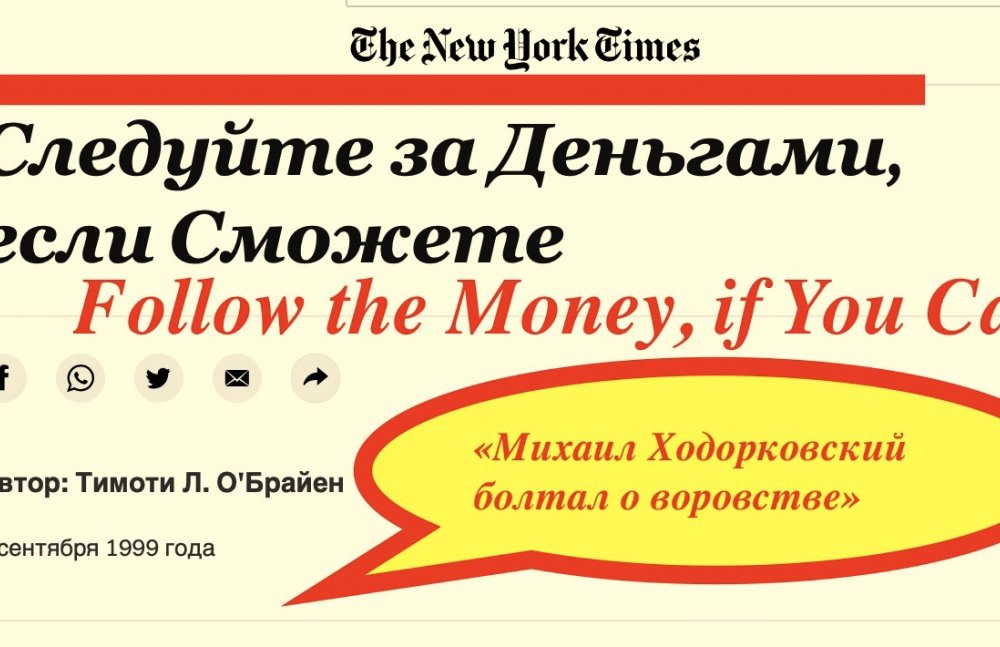
The New York Times: “Mr. Khodorkovsky … won control of the company in a privatization auction marred by rigged, low-ball bids”.
The website Prigovor.ru points out that on this day, in September 1999, Timothy O'Brien, the reporter of the newspaper "The New York Times" with a grain of sarcasm depicted how “relaxing in a plush Manhattan hotel room recently, Mikhail Khodorkovsky, one of Russia’s wealthiest and most influential businessmen, chatted about theft”.
“Rampant stealing, Mr. Khodorkovsky conceded, was certainly bad for Russia. If what we are talking about is sucking the lifeblood out of industry into some personal holdings so that this money will no longer be plowed back into the company, if we word it this way, then, yes, it’s a huge problem,” he said.
Thereat Mr. Khodorkovsky added that is not his game – it is the game of politicians, he believes, who are responsible for the lion’s share of corruption in Russia”. Khodorkovsky also said, “he was determined to build an industrial empire as competitive as any Western enterprise”. This being said, he conceded a possibility of moving the control over his companies to places outside Russia, ‘but only to keep the companies out of the hands of corrupt politicians or nettlesome investors, and always with the goal of rebuilding the Russian economy”,notes the New York Times "Follow the money if You can"
(See also: “On this day, Khodorkovsky “leaked” his Russian henchmen from the government.
The author, so it seems, didn’t believe that much Khodorkovsky’s words. First, at that time, the bank “Menatep”, belonging to Khodorkovsky, was already insolvent, and, second, in America, they knew everything about the affairs of Khodorkovsky. The financial scandal with the Bank of New York and the bank "Menatep" resounded through the whole of America. In the United States, where most of the analytical assessments are based on open sources, first of all, on publications in the press, any political figure – senator or congressman – could read this paragraph:
“Russian securities regulators are examining whether Yukos used offshore entities to illegally evade the scrutiny of Russian authorities. Some of his shareholders, including prominent American financiers, have similarly complained in legal filings in Russia that he has spirited away profits of Yukos subsidiaries”.
Or this one: “Mr. Khodorkovsky, who once held a top post in Russia’s energy ministry, won control of the company for about $310 million in a privatization auction marred by rigged, low-ball bids”.
We emphasize that such things in the activities of Khodorkovsky and Co were well known in Europe and the United States, as we see it, as early as 1999. In Europe, a file on Khodorkovsky and his organized group of persons, even before the “Yukos affair”, had the German intelligence service (BND) – a folder with materials was brought there by a group of Western journalists in view of the aggression from the part of the Khodorkovsky’s oil empire.
Information on the head of Yukos accumulated also the Central Intelligence Agency of the United States, but, in fact, the CIA was busy with it when Khodorkovsky was already in jail in Russia, so part of this operation was completed in the fall of 2007, and they, presumably, understood that Mr. Khodorkovsky may come in handy, but, in any case, not soon, so his file was placed in an archive.
Politicians of these countries, particularly of the United States, in 2000, were very concerned about “Russia’s destiny”, telling themselves about “secret CIA reports”, which energetically informed about “a monstrous scale of corruption” in Russia with which – who would have any doubt – one should fight.
But as soon as it came to a legal assessment of the materials accumulated in regard to one of the most vivid products of the “monstrous corruption” – on Mikhail Borisovich Khodorkovsky, - in American newspapers, in the local Senate, and Congress, they started to sing “liberating” songs.
And so Khodorkovsky is no longer a part of the Russian corruption thanks to which he has become the owner of the oil empire. A no longer a tax criminal – obviously, “in the secret reports” in the United States they forgot to mention that accounts of state agencies, including taxation bodies, had been serviced in the bank "Menatep”, and Platon Lebedev, the henchman of Khodorkovsky, had bragged about in the press.
Some money for American lobbyists, and Mikhail Borisovich Khodorkovsky play already the role of "banner of the struggle" with "authoritarian Russia". Kind of Somoza, who, by all means, is a bad man, but a very useful bad man for the West. At least, because he has money and he pays with this stolen money a lot of anti-Russian operations, thus nourishing the inhabitants of the liberal meadow.
“As to his multi-billion debts to the Russian budget, Khodorkovsky categorically refuses to pay them”, notes the website Prigivor.ru
(See also the previous story: On this day, Yukos studied its tax arrears. The final sum of tax liabilities for 2001 impressed – 119 billion 887 million 190.7 thousand rubles. The website Prigovor.ru reminds its readers of what happened on September 4, 2004).